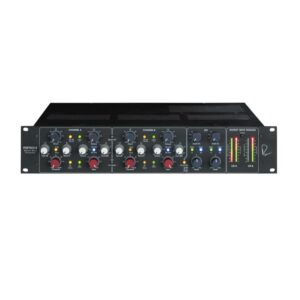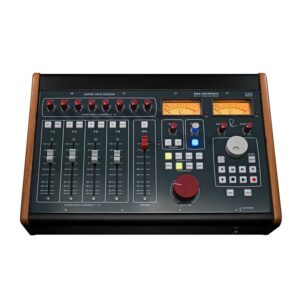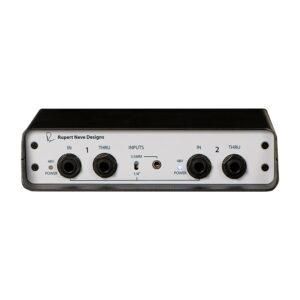$3,999.00
SKU:
RUPMBT
Categories: Dynamics Processors, Outboard
Tag Rupert Neve Designs
Brand: Rupert Neve Designs
$3,999.00
For over six decades, audio transformers have been the bedrock of Mr. Rupert Neve’s audio circuit design philosophy – and Rupert Neve Designs’ bespoke transformers are an integral part of virtually every RND product. Packed with these transformers, the MBT provides an incredible array of flavorful options designed to sweeten, enhance, drive, widen, and utterly transform source material, making it the ultimate tool for musical coloration. Equally at home on a full mix, groups, stems or individual sources, the MBT pairs undeniably legendary tonal quality with an immensely flexible set of controls to shape your sound.
Create Tonal Magic with the HPF & Shelf EQ
First in line is a smooth high pass filter with a fully variable frequency selection control. The HPF extends from 100Hz all the way down to 15Hz, an especially helpful area to manage on a full mix that needs to be as loud as possible.
Next up is the all-new 2-band Shelf EQ section – with 3 octave ranges, gentle slopes and minimal phase shifts, this EQ was created with an emphasis on simplicity and elegance. This smooth & musical EQ is excellent at providing just the right amount of tonal enhancement – especially when it is interacting with the other sections of the MBT.
Each band has +/- 9dB of gain control, with the LF EQ corner frequency variable from 30Hz to 240Hz and the HF EQ corner frequency variable from 3kHz to 24kHz. The LF band is excellent at either taming or accentuating low-end to give source material an exacting amount of weight and power. The HF band provides a wide range of corner frequencies to choose from, allowing adjustments to be made from the upper midrange all the way up to the very top end, giving tracks extra shine and clarity.
One exciting aspect of using the MBT is discovering how the different sections can interact with each other. Sometimes the EQ can be dialed in first, other times it can be left alone until the other sections are dialed in. One thing is certain: the MBT encourages experimentation at every turn.
Breathe In New Life with the Color Comp
With an all-new optical compressor design, the Color Comp excels at accentuating the non-linear distortion and “colorful” characteristics of the Opto cell to bring source material a new sense of life and depth.
The compressor ratio can be set to a low (2:1) ratio for subtle & smooth compression or high (5:1) for much more dramatic behavior.
The variable high pass side chain filter removes the low frequencies from the compressor side chain circuit, allowing low-end information to pass through the compressor untouched while the compressor focuses on the rest of the signal. With a sweepable range from 20Hz all the way up to 350Hz, this is a highly flexible tonal shaping control providing the ability to leave the low end intact while taming or squashing the rest of the source material as needed.
The Color Comp also contains a Blend control, making it easy to use the compression circuit in parallel with the uncompressed source material. This can be especially useful when wanting to dial back the harmonic content, dynamic range reduction, and transient squashing from more extreme compressor settings.
The threshold is variable from 0dBu to +24dBu, with a gain reduction LED illuminating when the signal passes the threshold. However, the Color Comp also introduces audible non-linear harmonic content even with just a touch of gain reduction – as such, we highly recommend listening to the Color Comp engaged even when no gain reduction is visible, in order to discern the amount of tonality that it introduces. The pleasing nature of this harmonic content will become even more apparent as the compressor settings become more extreme.
The release is variable from 100mS to 1.5S. By dialing in higher ratios and faster releases it is possible to get the color comp to actively “pump” with the attacks, whereas with slower release times it will operate in a much smoother manner.
Lastly, the color comp has 20dB of Class-A makeup gain. This is not only useful for level-matching the before and after compression signals, but also for driving the interstage transformers found in the Super Silk section for even greater harmonic enhancements.
Find New Dimension with Width
The Width section is designed to increase the perceived stereo spread without losing low-end focus. While inspired by the Stereo Field Editor (SFE) “WIDTH” controls found on our award-winning Master Buss Processor, the MBT’s width section has two key differences: First, the width control on the MBT is additive only, with a greater range for more extreme operation. Second, there is a variable HPF from 50Hz to 800Hz to adjust the width content so that low frequencies remain more centered in the mix as the mids and highs are spread out to create more space. Additionally, there is subtle high frequency tapering of the width content to avoid overemphasizing harsher HF tones.
Control Harmonics Like Never Before with Super Silk
Introduced nearly twenty years ago, the Silk circuit has long been a favorite for Rupert Neve Designs users. First available as a simple on/off switch, then with selectable Red and Blue modes and the variable Texture control, Silk exists to enhance and control even and odd order harmonic content in any source material.
Super Silk is the latest advancement to this beloved technology: featuring independent Red, Blue, Harmonics and Zener Drive controls, harmonic manipulation is taken to a whole new level with the MBT.
Historically, Silk was always applied to a unit’s output transformers. But when designing the MBT, a need was felt to offer even greater control and flexibility – therefore, Super Silk also includes an extra set of transformers to further expand the possibilities of this much-loved circuit. This design provides a way to drive into Super Silk for more dynamic saturation and transient clipping, while also being able to attenuate the signal for proper gain staging after Super Silk by using the Output Trim.
Silk Red accentuates harmonics in the upper mid and high frequencies, adding sparkle and sheen. Silk Blue accentuates harmonics in the low & low mid frequencies, creating more depth and weight. The Harmonics control increases the overall musical harmonic content by saturating the MBT’s custom interstage transformers; this setting will interact with the settings for both Silk Blue and Silk Red, so experimentation is encouraged to find new blends and balances.
Lastly, the switchable Zener Drive is a diode-based asymmetrical soft clip circuit that introduces mostly odd order harmonic content as the signal approaches the edge of the MBT’s headroom to achieve a more aggressive tonality.
Drive and Control Levels with I/O Amplifiers
To maintain optimal gain staging through the MBT, fully drive the interstage transformers, and accurately match the pre / post signals, the MBT includes Class-A input and output amplifiers to manage all levels. The output amplifiers feed Rupert Neve Designs’ custom output transformers for line balancing and isolation.
FEATURES
MBT Front Panel Controls
Input Level
LED indication that illuminates GREEN when the input signal reaches -20dBu and illuminates RED to show when the input signal reaches +23dBu. This indication is post input trim control.
Input Trim
31-detent potentiometer that controls the input level within a range of +/- 12dB.
HPF Freq
31-detent potentiometer that controls the HPF frequency within a range of 15Hz to 100Hz.
HPF In
Push-button switch that illuminates GREEN when the 6dB/octave HPF is engaged.
LF
31-detent potentiometer that controls the Low Frequency Shelf gain within a range of +/- 9dB.
LF Freq
31-detent potentiometer that controls the Low Frequency Shelf corner frequency within a range of 30Hz to 240Hz.
HF
31-detent potentiometer that controls the High Frequency Shelf gain within a range of +/- 9dB.
HF Freq
31-detent potentiometer that controls the High Frequency Shelf corner frequency within a range of 3kHz to 24kHz.
EQ In
Push-button switch that illuminates GREEN when the equalizer section is engaged.
Threshold
31-detent potentiometer that controls the compressor threshold within a range of +24dBu to 0dBu.
S/C HPF
31-detent potentiometer that controls the corner frequency of the S/C HPF within a range of 20Hz to 350Hz.
Comp In
Push-button switch that illuminates GREEN when the compressor section is engaged.
Gain Reduction
LED that illuminates GREEN when gain reduction is occuring. The LED indicates compression for left and right channels simultaneously.
Release
31-detent potentiometer that controls the Release time of the compressor within a range of 100mS to 1.5S.
Ratio
Opaque push-button switch that toggles between a LO (OUT) 2:1 ratio and a HI (IN) 5:1 compressor ratio curve.
Blend
31-detent potentiometer that controls the amount of dry (0%) vs. wet (100%) compressed signal in the audio path.
Gain
31-detent potentiometer that controls the amount of compressor make-up gain within a range of 0dB to +20dB.
Width In
Push-button switch that illuminates GREEN when the WIDTH section is engaged.
Width HPF
31-detent potentiometer that controls the corner frequency of the width processing HPF within a range of 50Hz to 800Hz.
Width
31-detent potentiometer that controls the amount of Width stereo field processing within a range of MIN to MAX.
SILK In
Push-button switch that illuminates PURPLE when the SUPER SILK section is engaged.
Blue
31-detent potentiometer that controls the amount of low frequency SILK pre-emphasis.
Drive
LED that illuminates RED when the signal level reaches the optimal range for transformer harmonics. The LED indicates drive level for left and right channels.
Red
31-detent potentiometer that controls the amount of high frequency SILK pre-emphasis.
Harmonics
31-detent potentiometer that controls the amount of transformer harmonics added to the audio path.
Zener Drive
Push-button switch that illuminates AMBER when the soft clip circuitry is engaged.
Bypass All
Push-button switch that illuminates RED when the master bypass is engaged. This master bypass is a true hard-wire bypass that ensures the MBT will pass audio in the event that power is lost.
Output Trim
31-detent potentiometer that controls the amount of output trim within a range of +/- 12dB.
Output Meters
Stereo 16-segment LED meters that indicate output level in dBu.
Power
LED that illuminates GREEN when POWER is ON.
MBT Rear Panel
Power
IEC standard 3 pin grounded switched AC power inlet with an input range of 100-240 VAC, 50/60Hz. 70 Watts maximum AC power consumption.
GND Lift
Slide switch that lifts XLR Output Pin 1 from chassis ground to minimize ground loops.
Output
Balanced XLR outputs with custom Rupert Neve Designs transformers capable of handling up to +25.5dBu at 1kHz.
Input
Balanced XLR combo jack inputs capable of handling up to +26.8dBu at 1kHz.
Note: All measurements typical; All measurements recorded using 25ft. XLR output cables with Balanced ZSOURCE = 40 ohm
Input Impedance: 10 kilohm
No Features Engaged
HPF Engaged
Noise (22 Hz – 22 kHz): Better than -95 dBu
THD+N (+20 dBu @ 1 kHz): Better than 0.002%
Equalizer Engaged
Noise (22 Hz – 22 kHz): Better than -93dBu
THD+N (+20 dBu @ 1 kHz): Better than 0.002%
Compressor Engaged
Noise (22 Hz – 22 kHz): Better than -92dBu
THD+N (+20 dBu @ 1 kHz): Better than 0.002%
Width Engaged
Noise (22 Hz – 22 kHz): Better than -88dBu
THD+N (+20 dBu @ 1 kHz): Better than 0.002%
SILK Engaged
Noise (22 Hz – 22 kHz): Better than -95dBu
THD+N (+20 dBu @ 1 kHz): Better than 0.003%
WEIGHTS & DIMENSIONS
Product Dimensions (W x D x H): 19” (48.3 cm) x 10.125” (25.7 cm) x 3.5” (8.9 cm)
Shipping Dimensions (L x W x H): 22” (55.9 cm) x 18” (45.7 cm) x 8.7” (22.1 cm)
Shipping Weight: 17 lbs. (7.7 kg)

-
Add to cart
-
Add to cart
-
Add to cart
-
Add to cart© 1969–2024 Westlake Pro. All rights reserved.
Privacy Policy | Price Policy
| Cookie | Duration | Description |
|---|---|---|
| cookielawinfo-checkbox-analytics | 11 months | This cookie is set by GDPR Cookie Consent plugin. The cookie is used to store the user consent for the cookies in the category "Analytics". |
| cookielawinfo-checkbox-functional | 11 months | The cookie is set by GDPR cookie consent to record the user consent for the cookies in the category "Functional". |
| cookielawinfo-checkbox-necessary | 11 months | This cookie is set by GDPR Cookie Consent plugin. The cookies is used to store the user consent for the cookies in the category "Necessary". |
| cookielawinfo-checkbox-others | 11 months | This cookie is set by GDPR Cookie Consent plugin. The cookie is used to store the user consent for the cookies in the category "Other. |
| cookielawinfo-checkbox-performance | 11 months | This cookie is set by GDPR Cookie Consent plugin. The cookie is used to store the user consent for the cookies in the category "Performance". |
| viewed_cookie_policy | 11 months | The cookie is set by the GDPR Cookie Consent plugin and is used to store whether or not user has consented to the use of cookies. It does not store any personal data. |
We carry all of the top brands for audio and post-production, so don’t hesitate to contact us if you need something specific!
No Interest if paid in full within 12 Months**
On qualifying purchases made with your Westlake Pro credit card. Interest will be charged to your account from the purchase date if the promotional purchase is not paid in full within 12 Months. Minimum monthly payments required.
**No interest will be charged on the promo purchase if you pay it off, in full, within the promo period. If you do not, interest will be charged on the promo purchase from the purchase date. The required minimum monthly payments may or may not pay off the promo purchase by the end of the promo period. Regular account terms apply to non-promo purchases and, after the promo period ends, to the remaining promo balance. For new accounts: Purchase APR is 29.99%. Minimum interest charge is $2. Existing cardholders: See your credit card agreement terms. Subject to credit approval.
Contact Westlake Pro’s Design Services Group for a free consultation about your next project.
We hate spam. We don’t share your information with any third parties.
